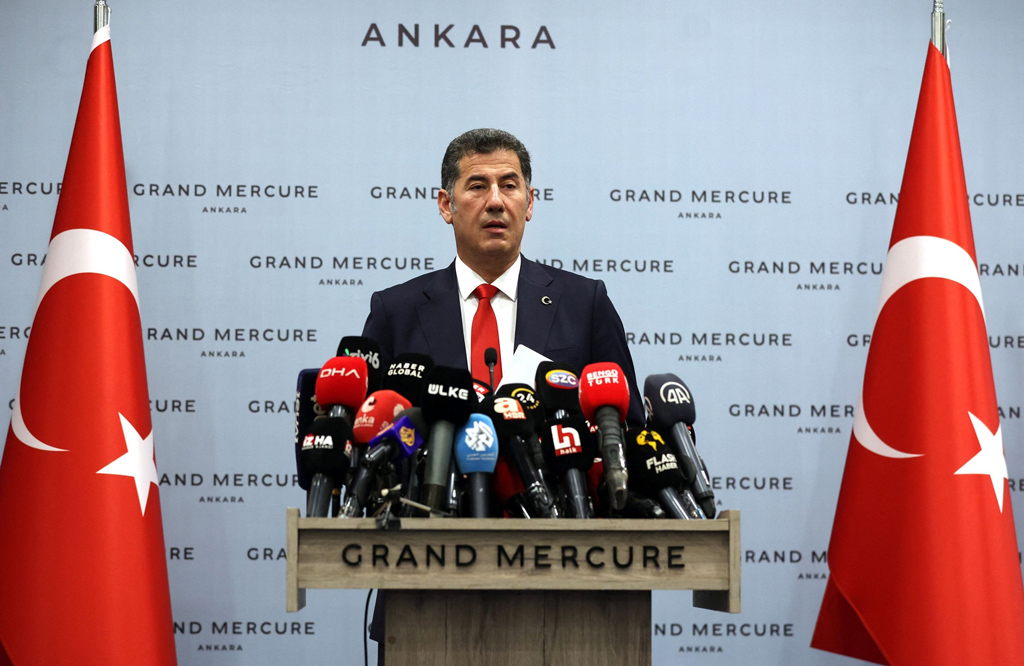Sinan Oğan, who contested the presidential election as the ATA Alliance’s candidate,
endorsed President Recep Tayyip Erdoğan ahead of Sunday’s second round. Rejecting allegations of a “deal” between himself and the incumbent, he insisted that he acted in line with his “principles” and highlighted the importance of “stability” with reference to the People’s Alliance’s parliamentary majority.
Since nationalist voters are unhappy with Kemal Kılıçdaroğlu’s endorsement by the PKK and the Peoples’ Democratic Party (HDP), it was perfectly reasonable for Oğan to go with Erdoğan in the second round. In doing so, the ATA Alliance’s candidate acted like a politician who wants to make a permanent mark and avoided the “lose-lose” trap the Good Party (IP) got stuck in as part of the "table for six."
It goes without saying that Oğan’s endorsement will contribute to the already powerful People’s Alliance. By contrast, it will further demoralize the Nation Alliance.
After all, Kılıçdaroğlu intended to receive Oğan’s endorsement to try and regain momentum with the help of his new nationalist campaign rhetoric. He hoped to fire up his supporters from the first round to ensure that they would show up at polling stations on Sunday.
In the end, Oğan’s decision undermined Kılıçdaroğlu’s discourse regarding asylum-seekers and revealed just how difficult it will be for the main opposition leader to distance himself from the PKK and the HDP.
It remains to be seen whether Ümit Özdağ, the Victory Party’s (ZP) chairperson, will make a different decision today. He might also criticize both candidates to remain neutral.
Either way, Oğan’s endorsement matters because he received more than 5% in the presidential election’s first round.
New campaign
Against the backdrop of those developments, the main opposition party replaced its campaign slogan, "I Promise You, to Make Your Choice." The new campaign accuses the government of terrorism and fuels fear and concerns among voters regarding the economy and democracy in an obvious attempt to tap into the power of popular concerns over the country’s future.
I would say that opting for a completely negative campaign represented yet another mistake for Kılıçdaroğlu, who misinterpreted the nationalist mindset to embrace the arguments of Western-style radical right-wingers.
For example, the main opposition leader’s discourse alienates asylum seekers to such an extent that it could frustrate Kurdish voters.
Moreover, this new campaign cannot measure up to Erdoğan’s ambition of “the great Türkiye” in a range of areas, from the defense industry to foreign policy, nor his positive sense of national values.
It is also important to recall that the repatriation of asylum seekers has been on the Justice and Development Party (AK Party) government’s agenda for some time. Let us remember that Türkiye’s post-2016 incursions into Syria served two purposes: to prevent the emergence of the PKK/YPG’s terror corridor and to facilitate the dignified and
safe return of asylum-seekers to their country.
The Turkish government has already demonstrated its willingness to normalize with Syria’s Bashar Assad for this purpose by holding ministerial meetings.
1st round 'conclusions'
At the same time, some folks, who absolutely do not want Erdoğan to remain in charge, are still coming to terms with the first round’s outcome.
Let us leave aside anyone that insulted earthquake survivors for supporting the incumbent. That was a deranged act fueled by secularist anger turning into hate.
Looking at how some columnists, who guided the opposition with their arguments, account for the opposition’s defeat, one comes across the conclusion, mixed with disappointment, that they “could not get to know parts of society.”
Some responded that “the People’s Alliance does not know the Nation Alliance either” in an attempt to comfort themselves, but this reckoning is obviously important for the opposition’s future.
It goes without saying that explaining why Erdoğan keeps winning requires the willingness to leave echo chambers as a first step. That, however, is not enough because there is a need to understand why Erdoğan’s supporters do not lock themselves up in echo chambers.
In truth, the Republican People's Party's (CHP) mentors suffer from what is popularly known as “being in love with one’s own brain.”
Contrary to popular belief, Türkiye’s conservatives listen to their opponents much more carefully. They may be critical of the government for some reason, but that does not stop them from making a rational decision when they ask themselves “who would govern better.”
Speaking of earthquake survivors, I do not believe that voting for Erdoğan, who opened a new hospital in the Defne district in Hatay within two months, was an “ideological” choice.
Politics of public works
Let us also recall that the AK Party has always opted for the “politics of public works” despite the identity debate. In other words, Erdoğan never offered the people nationalist statements devoid of content.
Instead, he used cars, ships, planes, bridges, airports and energy discoveries to back up his "native-national" discourse.
Meanwhile, the CHP-controlled municipalities failed to perform well enough to persuade voters that “the opposition, too, can govern properly.” The mayors of Istanbul and Ankara, Ekrem Imamoğlu and Mansur Yavaş, might have gained popularity in the Anatolian heartland and actually contributed to Kılıçdaroğlu’s campaign, had they done a good job over the last four years.
The bottom line is that Erdoğan wins elections by interpreting the signs of the times, connecting with the people, remaining open to change and working very hard.
[Daily Sabah, May 23, 2023]







